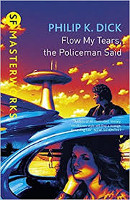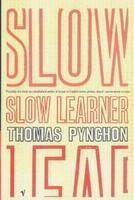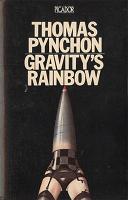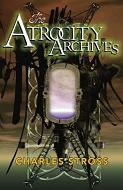 Masterworks is a series, now running to 73 titles, which was originally published by Millennium and is now being continued by Gollancz; consisting of classic SF tales which deserve to be kept in print. Philip K. Dick figures quite large in that run – so far this contains 14 (!) novels from his back catalogue.
Masterworks is a series, now running to 73 titles, which was originally published by Millennium and is now being continued by Gollancz; consisting of classic SF tales which deserve to be kept in print. Philip K. Dick figures quite large in that run – so far this contains 14 (!) novels from his back catalogue.
Dick, who died in 1982, published 44 novels and 121 short stories over the course of his life; a number of which won awards; the one at hand won the John W. Campbell Memorial Award in 1975.
Flow My Tears, the Policeman Said takes its title from a lute ayre (look it up!) by John Dowland, written in 1596 (yes, you read that right). One of the main characters loves the song, and quotes it in the story. Its lyrics also open each part of the book. The relationship between the song, its lyrics, and the story and underlying meaning and themes of the book would be the work of a PhD thesis, should one be so inclined (me? Not, sorry.)
The story follows Jason Taverner, a genetically modified human (a Six – presumably that's the sequence of attempted modifications) who is a singer and TV star with a 30 million audience at his weekly show. Except that, after being attacked by a lover/protégé, he comes around in a cheap hotel, and, much worse, in a world where no one remembers him, and where he has no records, papers, or database entries.
The latter is bad, as this is a police state, set in a USA after a 2nd civil war. The students (and their teachers), who are hold-outs from the war/coup, are still kettled in their campuses, barricaded in, some under terrible circumstances. This is a near-panopticon world, with pol (Police) and nat (National Guard) road blocks, random checks for ID on the road, with bugs attached to people and clothing (and to ID) sending regular blips with the location and who the owner/wearer is with. And if you don't have ID, or get picked up for the wrong reasons you are off to a labour camp, just like that. Essentially this is as close to a repressive panopticon society as you can get without ubiquitous computing.
On his way to extricate himself from this predicament, and whilst trying to make sense of what and where he is he comes across several characters who play foil to his emotional and intellectual superiority as a Six. The most notable ones are Police General Felix Buckman (who is the John Dowland fan), and his sister/lover Alys. Alys is into a lot of things which are considered illegal, or barely tolerated – without her brother and his position in this world she would most likely be dead, or permanently in a labour camp...
But she takes a strong interest in Jason Taverner, for a reason I did not see coming. Clever, that's all I'll tell you – find out for yourself!
This is a dark, dystopian,and claustrophobic world – not unusual for PKD, of course. Some people perceive that they have freedom (but might also not be free, as Taverner learns through his new status), but most definitely do not. This is the kind of police state that the Republican or Tory party (and, to be fair, New Labour just as much) would love to have if they could; and are definitely working on creating ...
Whilst this world and its political setting is all too scarily realistic (if slightly dated in terms of technology) I found that Taverner does not really come across as a 'real' human (then again, he might not be?), but maybe rather as someone with a split personality. On the one hand he is a really nice and caring guy, and on the other side he is this cold, calculating, narcissistic, and elitist creature that's very hard to love. He knows, instinctively, what his prerogative and place in the world is, even in a world where he does not exist, where no one remembers him. Does this have to do with being a Six? Is his callous and superficial part what was modified or added in him?
Then again, everybody seems to be damaged, warped, and off-kilter here. Maybe this rather is an expression of this damaged, suppressed, warped society.
I found the technology in the story rather interesting – on the one hand we have Lunar and Martian colonies, drop chutes in buildings, supersonic flying cars, videophones which can also play games, and distributed databases containing the records of every person on the planet. And on the other there is no mention of something like facial recognition, and the role this could play in such a setting. Some programming even mentions cards – Dick clearly only extrapolated in some directions (rather well where he did, though).
Overall impression? Well, it's a SF Masterwork, and I have to agree that it's a fascinating and very well written story. I wasn't completely blown away by it, though – both through its style, and due to some of the key characters I really did not connect with; both of which slightly alienated me. Not my favourite PKD story, but definitely worth reading, should you not have done so already...
Title: Flow My Tears, the Policeman Said
Author: Philip K. Dick
Series: SF Masterworks
Series Number: 46
Reviewer: Markus
Reviewer URL: http://thierstein.net
Publisher: Golancz
Publisher URL: http://www.orionbooks.co.uk
Publication Date: 2001 (original publication 1974)
Review Date: 150531
ISBN: 978
Price: UKP
Pages: 204
Format: Trade Paperback
Topic: SF
Topic: Alternative Reality
Thanks to the publisher for the review copy.













